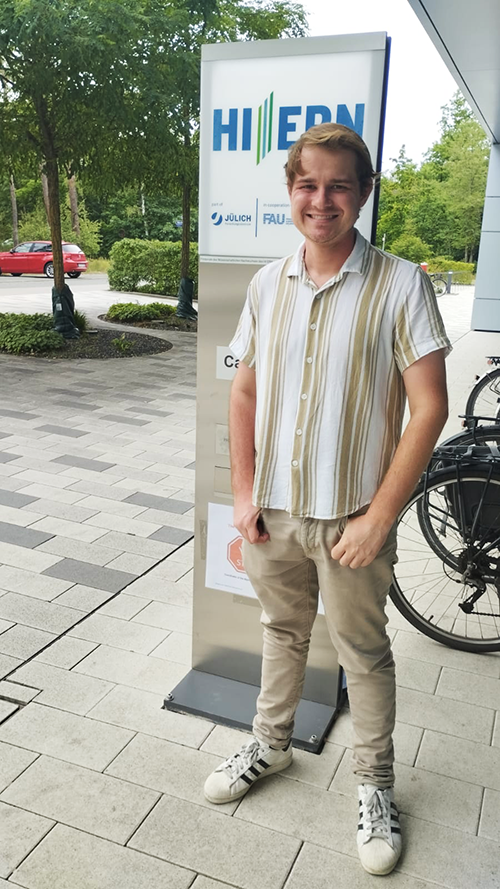As part of his DAAD Green Hydrogen Fellowship, PhD student Nicolas Paraskevas recently completed a research internship at the Helmholtz Institute for Renewable Energy Erlangen-Nürnberg (HI-ERN). Under the guidance of Prof. Jens Harting, Nicolas focused on hydrogen-related energy systems, contributing to cutting-edge research in fluid dynamics and electrochemical applications. Below, he shares a travel resume reflecting on his experience and insights during his time in Germany.
Exploring Fluid Dynamics in Hydrogen Systems
My project at the Helmholtz Institute for Renewable Energy Erlangen-Nürnberg (HI-ERN) explored the use of the Flory–Huggins potential within the phase-field Lattice-Boltzmann method to simulate droplet nucleation in two-phase systems. This approach enables the extension of two-phase fluid dynamics simulations to account for miscibility, which is particularly relevant in environments such as humidified gas streams and water-alcohol interactions in fuel cells and electrolysers. While the direction of the project was not one I had initially anticipated, it allowed me to engage with advanced modelling techniques and explore how such methods might be applied in electrochemical systems.
Interdisciplinary Collaboration and Research Insights
A key highlight of the experience was working with researchers from a range of disciplinary backgrounds, including physicists and engineers, which provided new perspectives on how to approach research problems. The collaborative research environment at HI-ERN fostered a strong sense of interdisciplinary exchange and broadened my thinking on how theoretical and applied work can intersect.
Living Abroad: Cultural and Personal Reflections
Beyond the technical work, living and working in Germany was both personally and professionally rewarding.

I appreciated the opportunity to engage with the local research community and experience everyday life in a different country.
Learning the German language, even at a basic level, proved valuable for navigating daily life and building stronger connections with colleagues. The experience gave me a deeper appreciation for the challenges that international students and researchers might face when moving to Australia, particularly in adapting to a new environment, language, and culture.
For future scholars, I would encourage embracing the experience fully, even if it feels unfamiliar or outside your comfort zone at first. Taking the initiative to engage with your host institution, connect with colleagues, and navigate a different cultural and research environment can be incredibly rewarding. I made many meaningful friendships during my time abroad and genuinely enjoyed learning about German culture. The fellowship offered more than just a research opportunity, allowing me to broaden my perspective, grow personally and professionally, and contribute to international efforts in the energy transition.